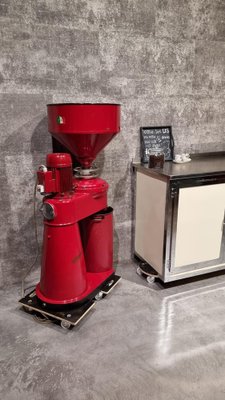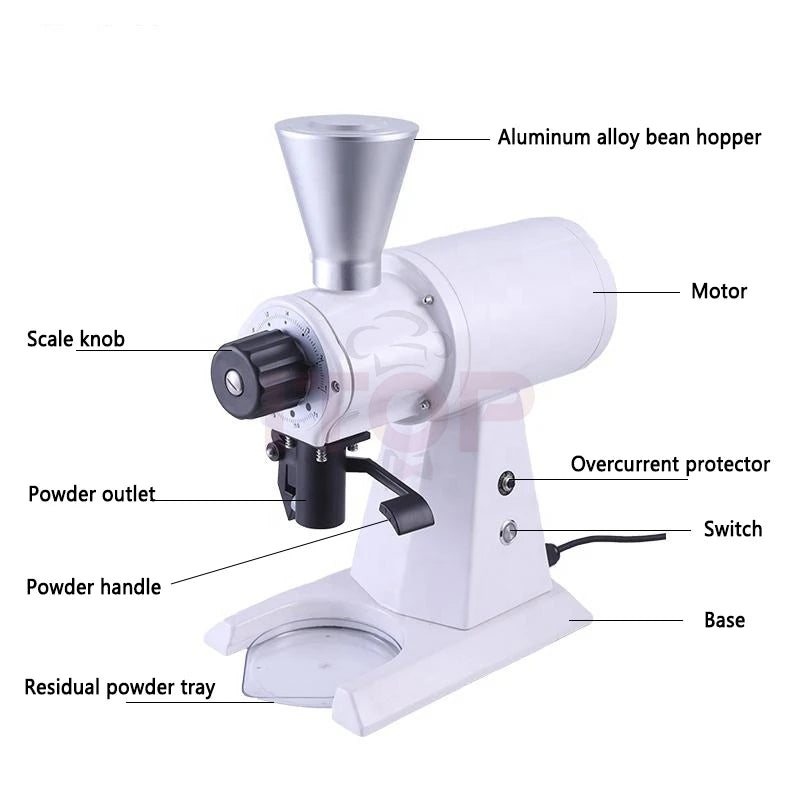How an Industrial Coffee Grinder Can Boost Your Coffee Quality
How an Industrial Coffee Grinder Can Boost Your Coffee Quality
Blog Article
Just How to Choose the Perfect Industrial Coffee Mill for Your Service
Choosing the ideal commercial coffee grinder for your business is a complex decision that requires careful consideration of a number of important elements. It is important to examine your particular grinding demands, including the quantity of coffee processed and the wanted grind uniformity, as these elements straight influence flavor and consumer fulfillment. Additionally, comprehending the various types of mills available can dramatically influence your functional performance. As you navigate these factors to consider, one have to also consider the implications of budget plan and upkeep. What various other elements could make or damage your selection?
Assess Your Grinding Needs
When selecting an industrial coffee grinder, one need to initially analyze their grinding requirements to make certain optimum performance and consistency. This preliminary analysis entails understanding the volume of coffee to be processed daily, along with the desired work dimension for numerous developing approaches. A high-capacity mill might be essential for businesses serving large quantities of coffee, while smaller sized procedures could locate an extra portable version adequate.
In addition, it is essential to consider the kinds of coffee beans being made use of, as various beans might call for details grinding strategies to attain the most effective taste profile. For example, oily beans might require a mill made to manage such attributes without overheating or clumping.
Another critical variable is the needed grind uniformity. Specialty coffee businesses often require accurate work sizes to enhance removal and taste, making it vital to pick a mill that can deliver consistent results. Ultimately, reviewing the offered space and electric requirements will certainly assist in selecting a mill that fits effortlessly into your functional process. By completely assessing these aspects, businesses can make educated choices that align with their coffee grinding demands, ultimately causing a superior product and completely satisfied customers.
Understand Grinder Types
Recognizing the various sorts of industrial coffee mills is vital for making a notified option that fulfills specific operational requirements. There are mainly two classifications of mills: blade mills and burr mills.
Blade mills make use of rotating blades to cut the coffee beans, causing an irregular work dimension - Industrial Coffee Grinder. While they might be extra budget friendly, they are often not suitable for commercial applications where precision is essential
On the other hand, burr grinders supply a much more uniform grind by crushing the beans between 2 surface areas. They can be more classified into flat burr and conical burr grinders. Apartment burr mills supply a constant grind size and are typically preferred for coffee prep work, while cone-shaped burr grinders are functional and can take care of an array of mixture methods, from espresso to French press.
When picking a mill, think about the particular needs of your organization, consisting of preferred grind uniformity, production volume, and the kinds of coffee beverages you plan to supply - Industrial Coffee Grinder. Each mill type has its advantages and restrictions, so comprehending these nuances makes it possible for notified decision-making that aligns description with functional goals
Evaluate Work Dimension Consistency
Attaining grind dimension uniformity is important for generating high-grade coffee, as variations in bit dimension can dramatically impact removal and flavor. When picking Get the facts an industrial coffee mill, it is important to assess exactly how well the device maintains uniformity in work dimension across various sets. Irregular grind dimensions can bring about unequal removal, leading to a cup that might taste weak or overly bitter.
To evaluate work size uniformity, consider mills with attributes such as adjustable work setups and top notch burrs. Burr grinders, in specific, succeed in producing consistent fragment sizes compared to blade mills. The product and shape of the burrs play an essential role, with stainless steel and ceramic alternatives offering sturdiness and accuracy.

Consider Production Ability
In the busy globe of coffee production, considering production capability is vital for companies intending to satisfy demand without sacrificing quality. The production capacity of a commercial coffee mill straight influences a business's capability to satisfy orders effectively, handle stock, and reply to varying market trends.
When evaluating production capacity, it is vital to assess the grinder's output price, commonly gauged in extra pounds per hour. This his explanation measurement ought to align with your business's projected sales quantity and development targets. A coffee shop with a high turn over may require a mill that can refine a number of hundred pounds daily, while a smaller sized procedure could be adequate with a reduced capability design.
Furthermore, consider the sort of coffee being processed. Various beans and blends may influence grinding rate and efficiency, demanding a grinder with the ability of managing diverse manufacturing needs. It's additionally worth factoring in the mill's capability to keep constant top quality under high outcome conditions, as any type of fluctuations can impact the end product.
Inevitably, choosing a mill that matches your company's manufacturing capacity will certainly ensure you stay receptive and affordable to client expectations.

Budget Plan and Maintenance Factors
When examining the best commercial coffee spending plan, maintenance and mill factors play a substantial role in the general decision-making procedure. A first financial investment in a premium grinder can produce lasting benefits, but it's crucial to develop a clear budget that aligns with your service's functional demands. Take into consideration both the acquisition price and potential operational costs, such as energy consumption and replacement parts.
Maintenance is one more vital element that can affect your spending plan. Industrial coffee mills call for routine maintenance to make certain optimum efficiency and durability. Examine the supplier's recommendations for upkeep, consisting of cleaning schedules and parts replacement, as these will certainly influence lasting functional expenses. Furthermore, think about the accessibility of service and support, as dependable assistance can mitigate downtime and repair expenses.

Buying a mill that is long lasting yet easy to keep can save cash in time. While lower-priced options may be tempting, they may sustain higher upkeep costs and lowered effectiveness. Inevitably, balancing first expenses with lasting maintenance and functional efficiency will certainly guide you to the very best choice for your organization's coffee grinding requirements.
Verdict
Choosing the optimal commercial coffee mill necessitates a comprehensive assessment of grinding requirements, mill kinds, grind dimension uniformity, manufacturing capacity, and budgetary considerations. An appropriate mill not just enhances the high quality of the coffee produced but also adds to the total success and profitability of the enterprise.
Specialized coffee organizations often require specific work dimensions to improve extraction and flavor, making it vital to pick a mill that can provide uniform results. Apartment burr mills use a constant grind size and are commonly preferred for coffee preparation, while conical burr mills are flexible and can manage a variety of brew approaches, from coffee to French press.
When choosing a commercial coffee mill, it is essential to evaluate how well the machine maintains uniformity in work size across various batches. Burr mills, in certain, stand out in producing consistent particle dimensions contrasted to blade grinders.Picking the suitable industrial coffee mill requires an extensive assessment of grinding demands, grinder kinds, grind dimension consistency, manufacturing capacity, and financial considerations.
Report this page